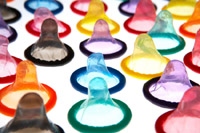Safer Sex
Why is Safer Sex Important?
 If you do not practice safer sex you are at greater risk of getting an STI. If you do not practice safer sex you are at greater risk of getting an STI.
An STI is a sexually transmitted infection, which is found in semen, blood and vaginal secretions and is passed on through unprotected vaginal, anal or oral sex.
In some cases STIs may also be spread through skin-to-skin contact, for example, with genital warts and herpes. Hepatitis B and HIV can also be caught through hand or finger cuts that come into contact with infected sperm, vaginal fluids or blood.
Additionally, safer sex can prevent pregnancy. However, pregnancy can also be prevented by the use of oral contraception, which does not mean you are practicing safer sex, since you are still at risk of getting an STI.
What is Safer Sex?
 Safer sex means sexual activity that does not involve any exchange of semen, vaginal fluids or blood with your partner. Safer sex means sexual activity that does not involve any exchange of semen, vaginal fluids or blood with your partner.
Safer Sex really means 3 things:
- That we use a condom in order to reduce the risk of getting or passing on STIs and unplanned pregnancy
- That we cover up body parts or open wounds that could be infected with a condom or dam (a latex sheet used for mouth/vagina oral sex)
- That sexual contact is ethical and is consented to, in that it only happens in a caring and respectful way and that no one feels forced into sexual contact
While the only way to be 100 per cent safe is to avoid sex altogether, this is not really realistic and you can improve your safety in several ways:
- Make the choice to always use a condom if you're having sexual intercourse
- Make the choice to always use a condom or dam when having oral sex
- Have you and your partner tested for STIs regularly
- Try not to have multiple partners
- You can also try safer sexual activities that don't involve actual intercourse, such as kissing, massage, cuddling and mutual masturbation.
It is important to remember that even when using condoms and dams for protection or when you only get into safer sex activities, STI's can still be passed on:
- Genital warts, genital herpes and other STIs can be passed on during protected sex (sex with a condom) because the condom does not always cover the affected area.
- Scabies or pubic lice can be passed on just by very close contact
- Unprotected oral sex can also spread some STIs, particularly herpes, gonorrhoea, and syphilis.
- There is a very low risk of getting STIs through mutual masturbation. For example Herpes and genital warts can be passed through hand and genital contact with open sores or cuts and Hepatitis B and HIV can also be caught through hand or finger cuts that come into contact with infected sperm, vaginal fluids or blood.
Sex therapy and Relationship Counselling is available in Sydney, New South Wales (NSW) - Melbourne, Victoria (VIC) - Adalaide, South Australia (SA) - Perth, Western Australia (WA) - Darwin, Northern Territories (NT) - Hobart, Tasmania (TAS) - Brisbane, Queensland (QLD) - Canberra, Australian Capital territory (ACT)
|
|


|


 If you do not practice safer sex you are at greater risk of getting an
If you do not practice safer sex you are at greater risk of getting an  Safer sex means sexual activity that does not involve any exchange of semen, vaginal fluids or blood with your partner.
Safer sex means sexual activity that does not involve any exchange of semen, vaginal fluids or blood with your partner.
